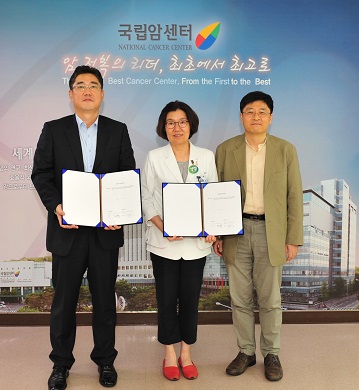The National Cancer Center said Monday it has transferred its patented technology used to develop anticancer therapies with genetically engineered T-cells to the biopharmaceutical startup, TiCARos.

The patented technology transferred was “Mutant CTLA4 gene transfected T cell and a composition comprising it for anticancer immunotherapy” NCC said.
"This technology will be a new milestone in the treatment of cancer,” NCC Director Lee Eun-sook said. “This technology transfer will serve as a good example of a positive cycle where NCC’s R&D efforts get linked to industrialization and commercialization.”
The next-generation immune cell therapeutics technology creates stronger immune cell therapies by transfecting genes with enhanced function into immune cells. It was patented in Korea in 2011, and in Japan and the U.S. in 2017.
According to Choi Kyunhg-ho, a Seoul National University professor, patent inventor, and TiCAROS co-founder, the technology dramatically improved the treatment efficacy of immunotherapies.
“This technology holds a unique immunosuppression concept not yet tried worldwide. Various preclinical animal studies have already demonstrated the treatment efficiency of inserting the technology into immune cells,” Choi said.
Global pharmaceutical firms have been developing various T-cell immunotherapies that target and kill cancer cells. Novartis gained the first-ever FDA approval for a chimeric antigen receptor T cell (CAR-T therapy) Kymriah (tisagenlecleucel) in August last year. Kite Pharma won the second go-ahead for its CAR-T treatment Yescarta (axicabtagene ciloleucel) in October.
Despite the landmark approvals, side effects and limited indications have been a setback.
“Immunotherapies such as Kymriah and Yescarta are showing good efficacy in blood cancer but poor in treating lymphoma and solid cancers. T-cell activating therapies also cause problems of side effects such as autoimmune diseases,” TiCARos CEO Lee Jae-won said.
“The transferred CTLA-4 gene transfection technology selectively acts on cancer-specific T-cells, greatly reducing side effects and dramatically improving efficacy,” Lee said.
Commercializing this technology will contribute to expanding the base of immune cell therapies, Professor Choi noted.

